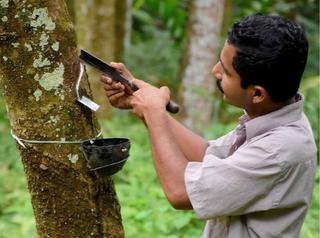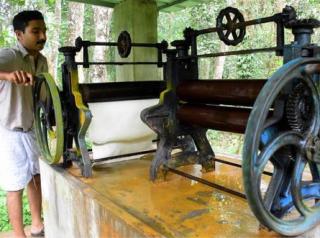BANGALORE, India — Faced with falling prices and rising imports, Indian rubber farmers and traders are blaming the federal government for their troubles.

A farmer extracts rubber from a plant in Indian state of Kerala. (Photo by 101Reporters)
From a high of 208 rupees ($3.24) per kilogram in 2011 prices for the benchmark RSS-4 (ribbed smoked sheet) natural rubber product have fallen to 125 rupees in July. In January 2017 local prices spurted to 145 rupees per kilogram, following reports of widespread flood damage to the rubber crop in Thailand. But the rally proved short lived.
George Valy, a rubber expert and a former official of India’s Rubber Dealers Association, says these prices mean that rubber is being produced at a loss. “The cost of production is 175 rupees per kilogram, without taking into account the investment in land. If interest is added to the cost, it will come to around 225 rupees a kilogram,” Valy said.
India’s imports of natural rubber contracted by 7% in the year ending March 2017, responding to higher international prices and rising domestic production. But planters are apprehensive about government moves to reduce subsidies to the industry and shut regional offices of the Rubber Board, a government agency charged with developing the sector. Natural rubber production rose by 23% to 690,000 tons in 2016-2017.
Planters in the southwestern state of Kerala protested publicly about suggestions that 14 of 26 Rubber Board offices in the state might be closed. “They (the central government) are planning to shut down the Rubber Board offices,” Kerala’s Agriculture Minister V.S. Sunil Kumar said. Ajith Kumar, chairman of the Rubber Board, told the Nikkei Asian Review that it is considering “restructuring” to reduce establishment and operating costs.
India is the world’s sixth largest rubber producer, with Kerala accounting for 80% of domestic production and the remainder grown in neighboring Tamil Nadu state and Tripura state, adjacent to Bangladesh.
In January 2016 the Indian Rubber Growers Association sought the central government’s intervention after domestic rubber prices fell to the lowest level in a decade, at 90 rupees per kilogram. But instead of raising tariffs on imported rubber, as the industry had hoped, the government slashed duties on rubber goods imported under an India-Malaysia Comprehensive Economic Cooperation Agreement.
In July, 2016 tariffs on car, bus and lorry tires were reduced by 5%, while tariffs on a slew of other rubber products were abolished. These included aircraft tires, sheath contraceptives, surgical gloves, floor coverings, erasers, hard rubber products, synthetic rubber of various types, waste and scrap rubber, tubes, pipes, hoses and conveyor belts.
The changes were a blow to rubber growers and traders, who were alarmed that tire manufacturers in India were already sourcing cheaper rubber from Malaysia, Vietnam and Cambodia.
“The maximum rubber imported till two years ago was only 300,000 tons per year,” said Anto Antony, a member of parliament representing the opposition Congress Party. “But in the last two years more than 900,000 tons have been imported. Over 90% of growers are small farmers. This policy directly affects the lives of at least 1.4 million rubber farmers.”
Antony said the central government was sacrificing the interests of farmers to benefit rubber-goods manufacturers.
Falling spending
Kumar also blamed the central government for Kerala’s rubber woes. “The center’s policies are not friendly to local rubber growers, as is clear from the export-import policy, the trade agreement with certain countries,” Kumar said. “In the last (state) budget we allocated 5 billion rupees for rubber farmers. The center is not willing to part with a single penny,” he added.
India’s 2017 federal Budget allocated 14.26 billion rupees to the Rubber Board, but this will not make much of a dent in the financial problems faced by rubber growers, industry experts said. Federal government spending on the sector has been falling since a cut from $35 million in 2014-2015 to $22 million in 2015-2016.

A rubber planter processing natural rubber in Indian state of Kerala. (Photo by 101Reporters)
It is also becoming clear that rubber growers lack departmental backing in New Delhi. Recent local media reports have suggested that the federal Commerce Ministry wants to transfer administrative control of commodity boards dealing with coffee, tea, rubber, spices, cashew and tobacco to the Agriculture Ministry, but the latter is resisting the transfer of rubber because it is not a food crop. An Agriculture Ministry official was quoted as saying, “Rubber is an industrial product and it’s not for mass consumption.” The Commerce Ministry did not respond to queries.
Meanwhile, tire industry representatives say that rubber imports are needed because of supply shortages and quality issues in India, and are inevitable if prices in domestic and international market are out of line. Rajiv Budhraja, director general of the Automotive Tyre Manufacturers’ Association, an industry body, urged the government to revive the rubber-growing sector by investing substantially in research and development. Budhraja also said that delays in a promised National Rubber Policy had raised doubts about the central government’s intentions.
S.P. Singh, president of the All India Tyre Dealers Federation, which represents the tire sales industry, said that rubber growers and tire manufacturers both had problems. “For the tire industry there are three issues. One, rubber should be available in the right quantity. Two, the price should be reasonable and remunerative to the seller. Three, rubber quality should be good,” he said.
“To achieve these, the Rubber Board should have had a definitive 20-year plan. The goal should be to ensure that the weakest link in the supply chain — the farmer — does not suffer,” said Singh. “The political side should stop worrying about tire manufacturers and focus on rubber farmers.”
However, Singh said the tire manufacturers were in a dominant position. “The government will by and large respond to the demands of tire makers,” he said.
Sibi Monipally, general secretary of the Indian Rubber Growers’ Association, said the industry was facing disaster. “Farmers are making a loss of $1 per kilogram. Many would either stop cultivation or switch to other crops,” he said.
However, farmers remain a powerful electoral constituency across India, as a recent spate of farm-loan waivers in several states suggests. With national elections due in 2019, Prime Minister Narendra Modi’s Bharatiya Janata Party-led government may have to find a way to reconcile small farmers’ interests with its professed faith in freer markets.
- nikkei.com



























